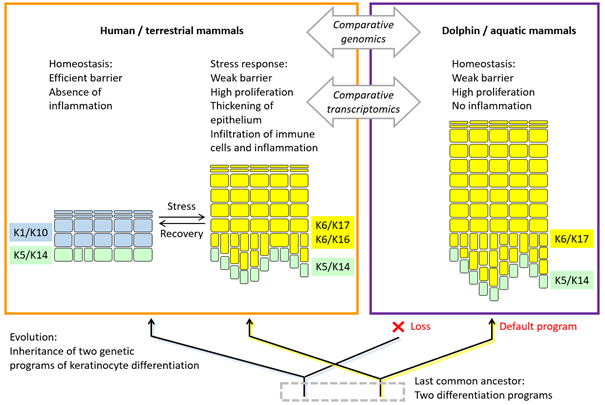Projects
• Barrier function of the skin
• Evolution and comparative genomics of the skin
• Mechanisms of programmed cell death
• Autophagy in tissue homeostasis and stress responses
• Evolution of innate immunity
Evolution of epidermal cornification proteins
Funded by Austrian Science Fund (FWF): P 28004 (2015-2019)
The cornified layer on the surface of the skin and skin appendages such as hair, feathers, and claws are mechanically resistant protective structures at the interface of the body and the environment. Their protective properties depend on the cross-linking of proteins in epidermal keratinocytes during an evolutionarily conserved processcalled cornification. The formation of disulfide bonds between cysteine residues is an important mechanism of protein cross-linking which is most efficient if proteins contain high numbers of cysteine residues. Accordingly, cysteine-rich proteins are major constituents of human nails and hair.
The aim of this project was to characterize protein components of the cornified epidermis and skin appendages in phylogenetically diverse vertebrates (mammals, reptiles, birds, amphibians) and to investigate the evolutionary genetics of cysteine-rich epidermal cornification proteins.
We identified genes that encode cysteine-rich keratins and epidermal differentiation complex (EDC) proteins of scales, feathers, and claws. Comparative genomics, molecular phylogenetics and gene expression analyses revealed a broad variety of evolutionary trajectories including diversifying evolution from a common ancestor, convergent evolution at the molecular level, and loss of genes during the adaptation to a new environment.
Main findings:
- Convergent evolution of cysteine-rich keratins in hard skin appendages of terrestrial vertebrates
(https://academic.oup.com/mbe/article/37/4/982/5652086) - Differential evolution of the epidermal keratin cytoskeleton in terrestrial and aquatic mammals
(https://academic.oup.com/mbe/article/36/2/328/5184281) - Epidermal cornification is preceded by the expression of a keratinocyte-specific set of pyroptosis-related genes
(https://www.nature.com/articles/s41598-017-17782-4) - Filaggrin has evolved from an S100 fused-type protein (SFTP) gene present in a common ancestor of amphibians and mammals
(https://onlinelibrary.wiley.com/doi/10.1111/exd.13317) - A stress response program at the origin of evolutionary innovation in the skin
(https://journals.sagepub.com/doi/10.1177/1176934319862246)
Evolution of an epidermal stress response program in terrestrial and aquatic mammals. Adapted from: A stress response program at the origin of evolutionary innovation in the skin. doi: 10.1177/1176934319862246.
Evolution of epidermal transglutamination
Project funded by Austrian Science Fund (FWF): P32777 (2020-2024)
The skin barrier to the environment depends on cross-linking of proteins in epidermal keratinocytes. A major part of protein cross-linking is mediated by transglutamination. Essential roles of transglutamination have been identified in human skin but little is known about how this important process has evolved and how it is controlled. The aim of this project is to determine the roles of epidermal transglutamination in the evolution of terrestrial vertebrates. We also aim to get new insights into the molecular regulation of transglutamination during keratinocyte cornification which is highly relevant for a better understanding of skin barrier defects in human patients.
Main findings:
Transglutaminase activity is conserved in stratified epithelia and skin appendages of mammals and birds
https://www.ncbi.nlm.nih.gov/pmc/articles/PMC9916842/
Cornification of keratinocytes is associated with differential changes in the catalytic activity and the immunoreactivity of transglutaminase-1
https://www.nature.com/articles/s41598-023-48856-1
An in vitro model of avian skin reveals evolutionarily conserved transcriptional regulation of epidermal barrier formation
https://www.jidonline.org/article/S0022-202X(21)01323-3/fulltext
Single-cell transcriptomics defines keratinocyte differentiation in avian scutate scales
https://www.nature.com/articles/s41598-021-04082-1

Transglutaminases cross-link proteins by introducing covalent bonds between glutamine and lysine residues.
Molecular evolution of skin appendages
Project funded by Austrian Science Fund (FWF): P36596 (2023-2026)
The aim of the project is to gain insights into the evolution of the genetic programs that control the development of cornified skin appendages, such as hair and nails.
The first results of the project were presented at the International Societies for Investigative Dermatology (ISID) Meeting in Tokyo, Japan (12.05.2023) and at the Annual Meeting of the Society for Molecular Biology and Evolution (SMBE) in Ferrara, Italy (25.07.2023).
Our data on the role of the transcription factor Hoxc13 in the evolution of claws and hair were published in Nature Communications:
Carron M, Sachslehner AP, Cicekdal MB, Bruggeman I, Demuynck S, Golabi B, De Baere E, Declercq W, Tschachler E, Vleminckx K, Eckhart L (2024) Evolutionary origin of Hoxc13-dependent skin appendages in amphibians. Nat Commun 15:2328. doi: 10.1038/s41467-024-46373-x.
Autonomous pigmentation of epithelial cells
Project funded by Austrian Science Fund (FWF): PAT8918924 (2025-2028)
https://www.fwf.ac.at/en/research-radar/10.55776/PAT8918924
The project addresses research questions about the mechanism and evolution of non-canonical pigmentation of skin epithelial cells. Please contact the project leader, Leopold Eckhart, if you are interested in joining this project.

